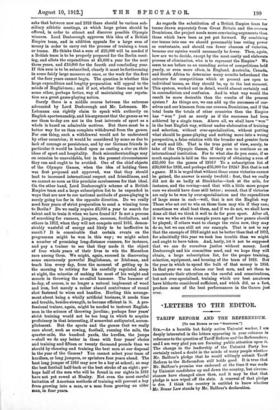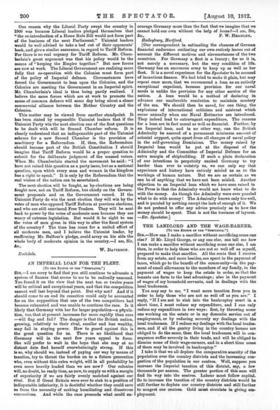• LETTERS TO THE EDITOR.
TARIFF REFORM AND THE REFERENDUM.
[To THZ EDITOR Or THr " SPECTATOR."] SIB,—As a humble but fairly active Unionist worker, I am deeply interested in the letters appearing in your columns in reference to the question of Tariff Reform and the Referendum; and I am very glad you are focusing public attention upon it. The change in the leadership of the Unionist Party has certainly raised a doubt in the minds of many people whether Mr. Balfour's pledge that he would willingly submit Tariff Reform to the Referendum still holds good. It is true that Mr. Balfour's promise was endorsed at the time it was made by Unionist candidates up and down the country, but circum- stances have changed since then, and it may be that that pledge is now wiped off the slate. A renewal of that pledge is due. I think the country is entitled to know whether Mr. Bonar Law stands by Mr. Balfour's declaration.
One reason why the Liberal Party swept the country in 1906 was because Liberal leaders pledged themselves that the re-introduction of a Home Rule Bill would not form part of the business of the next Parliament." Unionist leaders would be well advised to take a leaf out of their opponents' book, and give a similar assurance, in regard to Tariff Reform For there is no real urgency for Tariff Reform. Mr. Cham- berlain's great argument was that his policy would be the means of "keeping the Empire together." But new forces are now at work. The Liberal Government are realizing more fully that co-operation with the Colonies must form part of the policy of Imperial defence. Circumstances have forced the Government to lean upon the Colonies, and the Colonies are meeting the Government in an Imperial spirit. Mr. Chamberlain's ideal is thus being partly realized. I believe the same forces which are at work to promote the cause of common defence will some day bring about a closer commercial alliance between the Mother Country and the Colonies.
This matter may be viewed from another standpoint. It has been stated by responsible Unionist leaders that if the Unionist Party win the next election one of the first questions to be dealt with will be Second Chamber reform. It is clearly understood that an indispensable part of the Unionist scheme for a new Second Chamber is the provision of machinery for a Referendum. If, then, the Referendum should become part of the British Constitution I should imagine that Tariff Reform would be a proper question to submit for the deliberate judgment of the massed voters. When Mr. Chamberlain started the movement he said : "I have not raised this question as a party issue, but as a national question, upon which every man and woman in the kingdom has a right to speak." It is only by the Referendum that the real wishes of the nation can be ascertained.
The next election will be fought, as by-elections are being fought now, not on Tariff Reform, but chiefly on the Govern- ment proposals and on the Government record. If the Unionist Party do win the next election they will win by the votes of men who opposed Tariff Reform at previous elections, and who are still convinced Free Traders. They will be sent back to power by the votes of moderate men because they are weary of extreme legislation. But would it be right to use the votes of men given in this way to alter the fiscal system of the country ? The time has come for a united effort of all moderate men, and I believe the Unionist leader, by reaffirming Mr. Balfour's pledge, could array on his side the whole body of moderate opinion in the country.—I am, Sir,
Rochdale.
W. DAVIDSON.



































 Previous page
Previous page